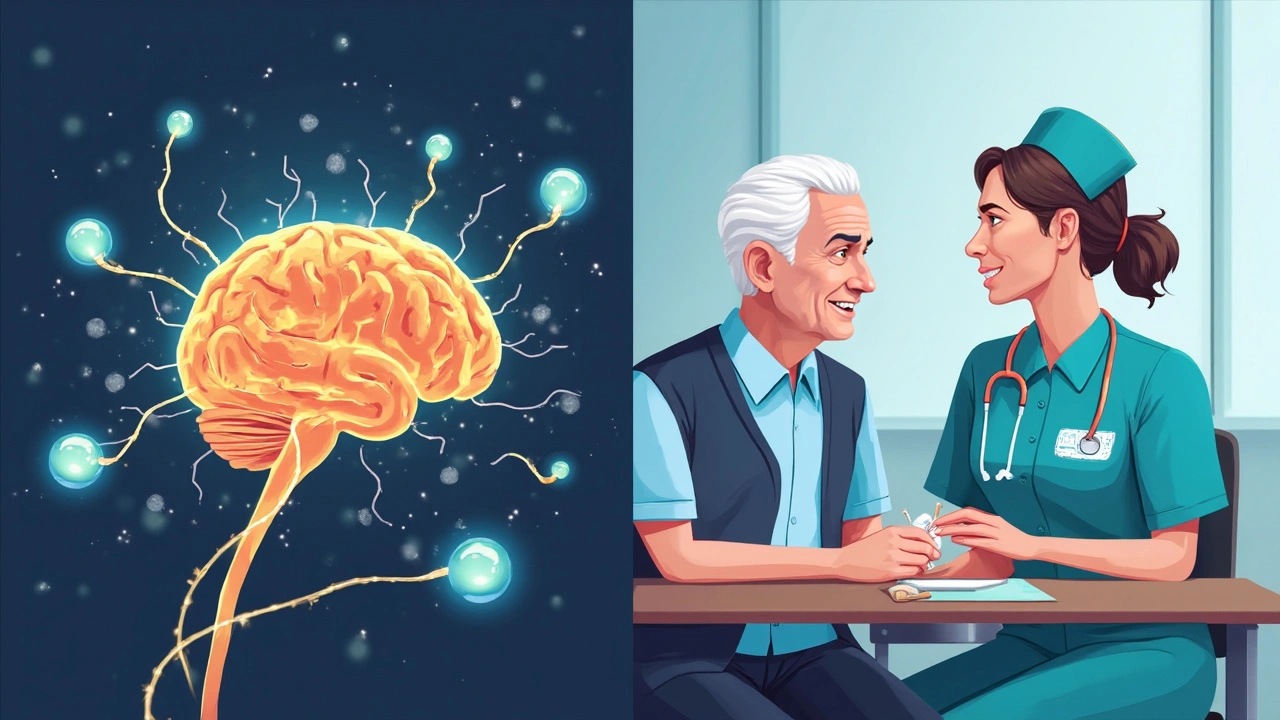Calcium Acetate's Surprising Role in Mental Health: What Science Says

Your brain and your bones don’t often show up in the same conversation—unless you’re talking about calcium. But what if I told you the pill you take for kidney disease, calcium acetate, could be quietly shifting your mood, memory, and maybe even your risk for depression or anxiety? That’s not some clickbait headline. Science is starting to unravel the tangled knot connecting your body’s calcium balance, kidney function, phosphate levels, and, yes, your mental health. The story’s messier than you’d think, and for folks relying on calcium acetate, knowing the facts could make a real difference.
How Calcium Acetate Works and Who Uses It
Calcium acetate isn’t something you’ll find in the average medicine cabinet. It’s prescribed mainly to people with chronic kidney disease (CKD), especially those on dialysis. Why? When your kidneys lose their edge, they stop filtering phosphate the way they should. Too much phosphate floating around in your blood causes all sorts of trouble—itchy skin, weak bones, heart disease. Calcium acetate jumps in as a “phosphate binder.” It grabs phosphate from your food in your gut, forming an insoluble lump that leaves your body through the bathroom, never giving it a chance to mess with your bloodstream.
Here’s the kicker: you’re not supposed to start munching calcium acetate just because you want stronger bones or a sunnier mood. Your doc asks for lab tests, watches your calcium and phosphate like a hawk, and often warns you about getting too much calcium from other sources. Overloading your blood with calcium (a condition called hypercalcemia) can trigger muscle weakness, confusion, and even heart rhythm problems. So, it’s a delicate balancing act—a tightrope walk between out-of-control phosphate and calcium overload. Most folks taking this med fit into one group: people with stage 4 or 5 CKD, often already dealing with a bunch of other health concerns. Yet, the ripple effects of this treatment reach your head as much as your heart and bones.
The Brain on Calcium: Why Balance Matters
Think about your brain as a busy call center. Neurons are zipping messages across gaps called synapses, chemicals jumping back and forth, chasing after every thought and feeling. Calcium is the unsung hero that lets those messages fire. Without the right balance, nerve cells have trouble sending their signals properly. Now, add in phosphate, which can build up in CKD and throw off this delicate chemical see-saw in all sorts of sneaky ways.
Here’s where it gets wild. Studies show that folks with chronic kidney issues are at a higher risk for things like depression, anxiety, and even confusion or psychosis than those whose kidneys work fine. Is it just the stress of a tough diagnosis? Maybe, but the story’s bigger than that. Being on calcium acetate changes the landscape inside your brain, by shifting how much calcium makes it across the blood-brain barrier—the wall that shields your brain from wild swings in your bloodstream.
Need proof? Let’s check some numbers. In a 2021 study of 500 dialysis patients in the U.S., 63% reported some type of mood disturbance, and about 30% qualified for moderate to severe depression. That’s way higher than people without CKD. Researchers noticed that these symptoms correlated with swings in calcium and phosphate—patients with higher phosphate and abnormal calcium were the most vulnerable. More than just an emotional side effect, this is a physical process playing out in your head.
How does calcium acetate fit in? It’s a lifesaver for limiting phosphate, but if it nudges your calcium levels too high, it can cause what doctors call “neuropsychiatric symptoms.” We’re talking confusion, trouble focusing, burst of anger or sadness, and in rare cases even hallucinations. All because nerve cells stop firing ‘on time’ thanks to too much calcium cramping their style. That’s why every few weeks, nephrologists order bloodwork and might change your dose—or switch to a different binder—if your mind feels foggy or your mood tanks. This isn’t a theoretical risk. I’ve heard patients describe feeling “off,” irritable, not themselves after bumping up their calcium acetate pills—even if their bones felt okay.

Calcium, Phosphate, and Mental Health: The Big Picture
Let’s zoom out for a second. Calcium and phosphate are more than just chemistry class topics; they’re two sides of a teeter-totter that keeps your nerves humming and bones strong. When kidneys can’t keep up, these minerals build up in ways that gum up the works inside your body and brain.
The link between kidney disease, phosphate, calcium acetate, and your mental health is finally catching the attention of big research groups. The National Institutes of Health (NIH) funded a 2022 study that tracked 1,200 dialysis patients for two years. About 40% of them developed new or worsening depression, and those with the highest calcium swings were two times more likely to get hit hard. Table time—check out some numbers from this and other recent studies:
| Study | Patient Group | Mental Health Impact | Calcium/Phosphate Trend |
|---|---|---|---|
| NIH, 2022 | 1,200 dialysis patients | 40% new/worse depression | High calcium swings = 2x depression risk |
| JASN, 2020 | 850 CKD stage 4/5 | 32% developed cognitive issues | Higher phosphate = worse memory scores |
| Nephrology Dialysis Transplantation, 2023 | 300 on calcium acetate | 23% had mood changes after dose increase | More mood swings in high-calcium patients |
For patients, this is more than stats. If the world feels gray and heavy—or if you’re noticing new anxiety or brain fog—it’s worth asking your nephrologist whether your calcium-phosphate balance is off. Sometimes, a simple lab test or a medication tweak can help get your mind back on track. Doctors might pivot to non-calcium phosphate binders like sevelamer if your mental health starts to dip, especially if blood calcium is running high. This isn’t about “making it up”—it’s a direct, measurable impact that shows up in blood and behavior.
Tips for Managing Calcium Acetate and Mental Health Together
If you (or someone you care about) takes calcium acetate, keeping a tight lid on your mental health is as important as following your kidney diet and hitting dialysis sessions. Here’s the rundown—but skip the medical jargon:
- Track your moods and memory. Jot down mood swings, fogginess, or anxiety in a daily notebook or phone app. Small changes can warn you of trouble before big issues hit.
- Crush labs, don’t dodge them. Show up for blood tests even when you’re feeling fine, since high calcium and phosphate sometimes sneak up without obvious symptoms.
- Watch for “hypercalcemia red flags.” These include muscle weakness, weird heartbeats, sudden confusion, or twitchy nerves. Get help right away if these show up.
- Keep your diet in check. Team up with your renal dietitian to avoid foods high in hidden calcium or phosphate, like processed snacks, cola drinks, and some dairy products.
- Don’t play doctor. Never change your calcium acetate dose without talking to your provider, even if you’re frustrated by side effects.
- Ask about alternatives. If you keep having mental health side effects, your doc might suggest swapping to another phosphate binder that doesn’t mess with your calcium.
And here’s a tip often missed: involve your support crew. Family or friends notice changes first. Ask someone you trust to flag when your memory, mood, or alertness feel “off.” This outside perspective helps doctors catch problems early.
If you’re noticing new mental health symptoms, don’t chalk it up to “just stress.” There’s a physical reason, and there are real fixes. No one should feel alone—your mental wellbeing matters as much as your lab results do.

What’s Next? New Science and the Future of Care
Researchers aren’t letting this topic fade into the background. There’s hot interest in finding safer ways to control phosphate without risking mental side effects. Companies are racing to develop and test new generations of phosphate binders. Some, like ferric citrate, seem to keep phosphate under control without bumping up your calcium. Meanwhile, patient groups are pushing for mental health screenings as a routine part of kidney care, especially whenever patients start or adjust phosphate binder doses.
Still, there’s no “one size fits all” answer yet. Genetics, age, and how long you’ve been on dialysis all tweak how calcium and phosphate mix things up in your brain. That’s why real-world stories matter. Patients who spoke up about mental fog led to stronger research and better care protocols. If you’re on calcium acetate, keep a voice in your own care and ask for changes if you’re not feeling your best—physically or mentally. Your doctor wants to hear about it, even if it doesn’t show up in a blood test. Be your own advocate. There’s more at stake than a few points on a lab chart.
The short version? Calcium acetate is a crucial player for kidney patients—but it’s no minor character in the drama of mental health. Knowing how this drug twists and turns inside your body gives you power to feel better, both above and below the neck. Pay attention, speak up, and never overlook the mind-body connection.



Kevin Cahuana
July 18, 2025 AT 04:58This is a super interesting angle on calcium acetate that I hadn’t really considered before. We often hear about it in relation to kidney health, but the connection with brain function and mental health is kind of mind-blowing.
It makes me wonder about how many other medications we use regularly that might have subtle effects on our mood or cognitive processes that just fly under the radar. I appreciate that the article includes real-world tips because navigating medication impacts can be so tricky for patients and caregivers alike.
Has anyone here had personal experience with calcium acetate and noticed any changes in mood or mental clarity? I'm curious about the practical side of this and how findings like this translate into everyday life.
Overall, I think exploring the biochemical balances between calcium and phosphate and their neurological outcomes is a promising research direction. Would love to see more studies on it!
Danielle Ryan
July 18, 2025 AT 05:08OMG, right?? Like, why is no one TALKING about this??? It’s almost like Big Pharma wants to keep us in the dark while pumping out these meds that mess with our heads!!! 💊💀
Phosphate and calcium levels influencing our brains? Sounds like a sneaky way to control moods, mental states, maybe even keep people docile?! I mean, think about it — if something as 'common' as calcium acetate can impact your mental health, how many other meds are out there doing the same thing quietly??
This is just too juicy. I bet they don’t mention this in the info sheets on purpose. We need to dig deeper and expose all this hidden science.
Anyone else feel like this article is just the tip of the iceberg? 👀
Robyn Chowdhury
July 18, 2025 AT 05:56Honestly, I find the whole connection between calcium acetates and mood rather dramatic but intriguing. It’s almost as if our bodies are a delicate, almost theatrical, interplay of minerals and chemicals impacting the stage of our minds. 🎭
Yet, I can't help but feel a tad skeptical about how significant these impacts are in practice. Does the science clearly demonstrate cause-and-effect, or is it more correlative? Sometimes these ideas get blown out of proportion, and we get caught up in what some might call ‘medical melodrama.’
Still, considering how many mental health issues persist and are poorly understood, even subtle influences like these deserve attention. The emoji for curiosity here is definitely going off. 🤔
Anyone have thoughts on how solid the evidence is?
Deb Kovach
July 18, 2025 AT 08:26This article sheds light on an underappreciated area of medicine. Calcium acetate's role beyond phosphate management, especially regarding psychiatric aspects, is something I wasn’t fully aware of either.
It’s crucial for patients undergoing treatment to discuss any mood changes with their healthcare team. Sometimes what seems like typical side effects might be linked to biochemical imbalances like these.
Further, caregivers should be watchful but not alarmist — monitoring, noting changes in usual behaviors, and encouraging open dialogue with physicians can make a huge difference.
Has anyone here tried adjusting calcium or phosphate intake and noticed improvements in mental health symptoms? Sharing experiences could help inform others.
😊Sarah Pearce
July 18, 2025 AT 12:36Not gonna lie, I skimmed the article a bit but it felt a little overcomplicated for something that might just be one small piece of a huge puzzle. Like, mental health is influenced by sooo many factors that it’s hard to isolate any single element.
Still, I appreciate the idea that calcium acetate might have some link, but I’d want more concrete evidence before thinking it’s a major thing. Sometimes these fancypants pharma claims are just to sell more drugs or make doctors look smarter.
Also, the tips on safer use — not sure how many people actually read those thoroughly. Guess it depends on the doctor and patient communication.
Anyway, does anyone know if different calcium compounds have different effects? Just curious.
Ajay Kumar
July 18, 2025 AT 16:46This article really opened my eyes to the complex interplay between mineral metabolism and neurological health. Coming from a background where kidney health is a big concern in my community, understanding that calcium acetate might affect mood and psychiatric risks is vital information.
It’s important that healthcare providers consider these aspects and tailor treatment plans holistically. I also think patients should be empowered with this knowledge so they can actively observe and report any mental health changes.
One question I have is about dosage — does the risk or effect vary significantly with dosage, or is it more subtle regardless of amount?
Really appreciate this kind of content that bridges multiple fields of medicine.
Richa Ajrekar
July 19, 2025 AT 06:40Honestly, I cannot praise this enough from a perspective of proper medical information. Many times, such effects are glossed over and patients suffer silently. Furthermore, the article should stress the importance of monitoring and precise dosage adjustments to prevent adverse mental health consequences.
Phosphate and calcium should not be treated lightly, especially when dealing with vulnerable populations with kidney disease and neurological issues. The research mentioned is crucial and hopefully will lead to stricter guidelines.
But also, be sure to verify all sources and avoid sensationalism. We owe it to patients to keep our discussions grounded in solid evidence and not speculation.
Pramod Hingmang
July 19, 2025 AT 20:33I really appreciate how this article fails to overlook the cerebral implications of what might seem like a regular treatment on the surface. Calcium acetate’s influence on the brain via mineral balance nuances makes the treatment landscape richer and more complex than often portrayed.
It’s a fine balance, really. Phosphate levels too high or low can disrupt mood, cognition, and psychiatric outcomes, which isn’t talked about enough.
And the fact this is addressed in a readable way with practical tips? Big thumbs up. It's a reminder how interconnected our bodily systems are and how a single treatment can ripple through various aspects of well-being.
Benjamin Hamel
July 21, 2025 AT 14:13Look, I’m not disputing the idea that calcium acetate can affect mental health, but let’s not get carried away and start blaming every mood swing on phosphate levels and calcium in the blood. The human brain and mood regulation are complex beyond simple chemical imbalances.
We tend to fetishize novel findings in science and make grand claims before strong replication. I’d like to see larger clinical trials and more rigorous data before jumping on this as a major mechanism.
Also, psychosocial factors and personal history can outweigh any biochemical tweaks this drug might do. Just my two cents.
Christian James Wood
July 22, 2025 AT 18:00You're totally right to be skeptical. But also, dismissing potential biochemical contributors to mental health issues without fully exploring them isn’t helpful either. These mineral imbalances can subtly shape neurological functions and psychiatric risks.
Gotta balance critical thinking with open-mindedness in this space. It’s not the whole story, but certainly a piece of it.
By the way, has anyone here read those studies that link phosphate dysregulation with mood disorders? The mechanisms are fascinating.
We need more integrated approaches to mental health that consider all these biochemical pathways rather than relying solely on therapy or psych meds.
Rebecca Ebstein
July 23, 2025 AT 21:46Wow, this is such a valuable thread! It makes me so hopeful about how knowledge like this can really change patient care and outcomes. 😊
I think awareness is the first step, and articles like this help a lot. It’s easy to feel overwhelmed by all the medical details, but breaking it down and highlighting the mental health connection is so helpful for the community.
If anyone has tips from experience on managing these calcium and phosphate adjustments without mood swings getting worse, please share. Would love to learn more!
Let’s keep this conversation going and spread awareness!